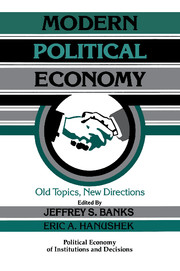Book contents
- Frontmatter
- Contents
- List of contributors
- Series editors' preface
- Preface
- Introduction
- 1 The economics and politics of regulation: perspectives, agenda, and approaches
- 2 Regulatory commitment and utilities' privatization: implications for future comparative research
- 3 The political economy of transformation: liberalization and property rights
- 4 Politics and trade policy
- 5 Elections, party structure, and the economy
- 6 The politics and economics of budget deficit control: policy questions and research questions
- 7 Law, legislation, and positive political theory
- 8 The rational choice theory of social institutions: cooperation, coordination, and communication
- Index
4 - Politics and trade policy
Published online by Cambridge University Press: 07 May 2010
- Frontmatter
- Contents
- List of contributors
- Series editors' preface
- Preface
- Introduction
- 1 The economics and politics of regulation: perspectives, agenda, and approaches
- 2 Regulatory commitment and utilities' privatization: implications for future comparative research
- 3 The political economy of transformation: liberalization and property rights
- 4 Politics and trade policy
- 5 Elections, party structure, and the economy
- 6 The politics and economics of budget deficit control: policy questions and research questions
- 7 Law, legislation, and positive political theory
- 8 The rational choice theory of social institutions: cooperation, coordination, and communication
- Index
Summary
The view that politics plays an important part in determining trade policy is widely accepted among international trade economists. Evidence of this can be seen in the recent surge of research activity focusing on a variety of questions concerning how the political decision-making process affects the determination of trade policy (e.g., Hillman 1989, Magee, Brock, and Young 1989, Grossman and Helpman 1992,1994). This essay attempts to assess the problems and prospects for this literature. We begin by discussing the origins of this literature from an economist's point of view. In this discussion, we try to indicate why economists have become interested in considering the effects of politics on trade policy and what they hope to learn from this effort. We then discuss how the literature has progressed in explaining the existence of protection and what important trade policy facts need to be explained in future research. Surveys of much of this literature have been done by Nelson (1988) and Hillman (1989). Rather than provide another survey, we highlight the types of questions that have been considered and the types of models that have been used.
Unlike traditional economic theory, progress in this area will require improvements in the modeling of both economic and political activities. We discuss elements of an optimal model, describe several important trade policy issues to which such a model should be applied, and illustrate some of the key elements of the optimal model by sketching a specific illustrative model and using it to address some of the issues raised earlier.
- Type
- Chapter
- Information
- Modern Political EconomyOld Topics, New Directions, pp. 108 - 144Publisher: Cambridge University PressPrint publication year: 1995
- 3
- Cited by

